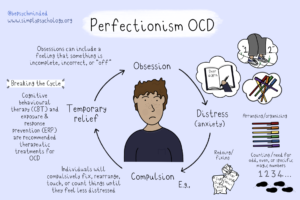
Perfection OCD
Perfection OCD is a subtype of OCD characterized by an intense preoccupation to be a perfect person in term of habits, gesture and actions to seek self-validation and validation as acknowledgment from others and having overwhelming reaction as fear of considering as making mistakes. Person with Perfection OCD experience intrusive thoughts, images, or urges related to being imperfection if not follow set pattern of actions that lead to compulsive actions aiming to be preventing perceived errors. Perfection OCD impact daily functioning, close relationships & well-being in general. Person with perfection ocd spend excessive time & energy on physical and mental rituals in checking, seeking reassurance as validation of correct acts to overcome anxiety. It involves rigid set rules as standards & unrealistic expectations to chase in day-to-day life leading to day-to-day distress and affecting multiple areas of life negatively.
- Excessive preoccupation of being and remaining with Perfect
- Constant fear of doing mistakes, trying to validate from self and others
- Doing compulsions such as correcting mistakes, excessive checking, rewriting organizing.
- Reassurance seeking behaviours, frequent reassurance from others to clear the anxiety about performance & correctness of self-actions.
- Difficulty in taking decisions because of polarise thinking, avoidance of decision making.
- Procrastination, postponing the due tasks due to the fear of not being able to complete.
- Perfectionism across multiple areas, Striving for perfection in all aspect of life.
- Low Self-Esteem: feeling low self-esteem & self-criticism when not able to achieve self-set expectation and expectation of others.
- Avoidance, avoiding situations, activities that may result in perceived failure.
- Physical Symptoms: Experiencing extreme anxiety, sweating, tingling, trembling, racing of heartbeat, gastrointestinal disturbance.
- Work and Academic Performance: Individuals spend excessive time and energy on tasks, projects, assignments that lead to decreased in productivity, missing deadlines, increased stress. fear of making mistakes prevent individuals from taking new challenges.
- Interpersonal Relationships: affecting relationships with family, friends, colleagues. Person struggle to accept imperfections in themselves and others because of unrealistic expectations. Because person have constant need for reassurance and validation create tension in relationships, as others feel frustrated by the proving constant reassurance.
- Emotional Well-being, Perfection OCD impact mental health and emotional wellbeing negatively as contributing to increasing anxiety, depression, affecting self-esteem. People with perfection ocd experience extreme negative emotions of incompleteness when face falling to fulfil self set standards. Its lead to vicious cycle of self-criticism, negative thinking about own self.
- Physical Health: Perfectionism OCD leads to headaches, muscle tension, sleeplessness, gastrointestinal trouble. Persistent pressure to meet set standards lead to burnout, fatigue
- Leisure and Enjoyment: Perfection OCD interfere with opportunity to involve in relaxing & entertainment activities. Person with perfection ocd start avoiding hobby, participation in social gathering that is perceive as possibility of being judge by others. That further leads to sense of isolation. Leading to compromising quality of life.
- Financial Impact: Perfection OCD lead to excessive spending to to compete the task in perfect manner as a result majority of time they lose career growth opportunity.
Overall, perfectionism OCD significantly impact routine functioning and compromise quality of life, if it is not treated create a effect like poison in life. Its needed to get relevant treatment approach at the earliest to minimise the impact of perfection OCD to learn new needed coping mechanism, learn healthiest approach to handling perfection OCD.
Causes and triggers of Perfection OCD
- Personality Traits: Certain personality traits, such as high levels of conscientiousness, perfectionism, high anxiety, high sensitivity become predispose and precipating factors to develop perfection OCD, such traits create a ground for the onset of perfection OCD.
- Environmental Factors: Traumatic stressful life events, such as childhood trauma, abuse, neglect, changes in life trigger development of perfectionism OCD, other environmental factor such as academic pressure, professional life demands, self expectations and expectation from others close one increase the impact of perfection OCD.
- Learned Behaviour: like other OCD subtype perfection OCD is also a learn behaviour. Most people develop to get the appreciation of others and imitation of close family members. Person learn perfection behaviors from caregivers, authority figures who follow high standards and put unrealistic expectations on themselves or others. Reinforcement of perfection behaviour further to complex situation.
- Cognitive Factors: Maladaptive beliefs and cognitive distortions, such as all or nothing thinking, overgeneralization, catastrophize reaction contribute to the development and maintenance of perfectionism OCD. Person beliefs about the importance of achieving perfection and extreme need of not making mistakes triggers perfection OCD.
- Triggering Events: Situations like performance evaluations, constant criticism, uncertainty in life, need to make decisions affect negatively perfection OCD. These triggers contribute in activating underlying fears of failure, rejection, inadequacy, that lead to heightened anxiety & ritualistic behaviors.
- Cognitive-Behavioural Therapy: CBT to identified negative distorted thoughts and learning more rational and healthy way of living and Cognitive restructuring to change perfectionist beliefs& thought patterns
- Exposure and Response Prevention: ERP to giving needed and relevant systematic exposure to control and achieve desire behaviour ERP expose person with perfection OCD gradually exposing individuals to situations that trigger their perfectionistic fears while refraining from engaging in compulsion.
- Mindfulness-Based Approaches: Mindfulness based cognitive therapy & acceptance and commitment therapy (ACT) guide individuals develop more self-awareness about their perfectionist thoughts without insecurity of being judge by others. Mindfulness encourages and guide acceptance of imperfections commitment for easy and better life with self-compassion.
- Lifestyle Changes: Adopting lifestyle changes, such as prioritizing self-care, setting realistic goals, practicing relaxation techniques, maintaining a healthy routine that reduce stress & chasing perfection.
- Psychoeducation: Proving relevant and needed education on perfection OCD, its sign, symptoms, triggers and treatment options empower individuals to take an active participation in their OCD recovery journey. During psychoeducation individuals develop insight into their present situation and how others are living and balancing life.
Way of addressing Perfection OCD by own self:
- Challenge your Perfection approach as how its is helping you.
- Set Realistic Goals based on common man ground as living a normal life.
- Practice Self-Compassion to enhance self-esteem, kindness towards self, understanding no one is perfect in the world, accepting imperfections is part of life.
- Develop Coping Skills: as enhancing humour, relaxation, mindfulness, meditation, increasing social network, volunteering, seeing other side of word as poverty and other limitations to accept life as it is and building resilience.
- Getting available Support: Reaching out to supportive friends, family members, Psychologist for guidance and assistance in managing perfection.
- Focus on Progress not Perfection: Shift the focus from achieving perfection to making progress, learning from mistakes, recognizing that growth & becoming better is important than being error free.
- Selfcare: focusing on diet, nutrition, workout, hobbies, entertainment, creative, spending time with family and friends
For any question write to us info@emotionoflife.in or reach out to us via call 9368503416 or visit or website- www.emotionoflife.in
